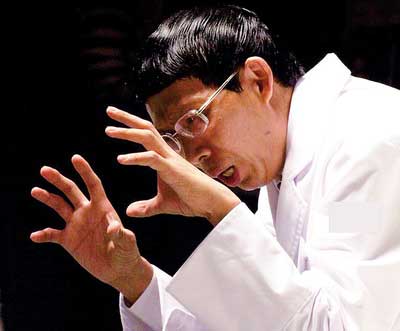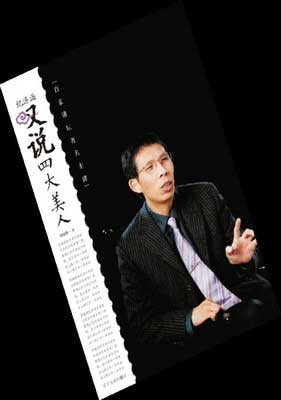 |
|
Ji Lianhai. [Global Times] |
Waiting in electric anticipation, dozens of people crowded together with books in hand longing for an autograph.
Were they waiting for a pop singer? Movie star? Neither. The man expected to appear is not your average celebrity.
Actually, the scene described above was from a signing promotion for a book on the four most beautiful women in Chinese history at a Beijing bookstore.
With his signature thick glasses and thin build, Ji Lianhai, a middle school history teacher turned rising intellectual celebrity, is widely known for his fresh perspective and insight into Chinese history, specializing in the Qing Dynasty (1644-1911).
Ji became famous through his appearances on CCTV’s program "Lecture Room" in July 2005, where Ji's engaging and interesting storytelling attracted a wide audience. Since then, Ji has been extensively published and continues to share his historical insight on TV shows and blogs.
"Ji is really cool. If my teacher in middle school could teach like this, we would be so much more interested in learning Chinese history," a young student told the Global Times at the book signing.
Unlike many academics, Ji turns tedious historical facts into entertaining lecture, often becoming so passionate about the subject at hand that he will stomp his feet and thump the podium during lectures. This exhilarating historian’s motto is "Respect history, but do not be confined by it."
Ji uniquely centers on lesser-known figures in history, exploring specific periods of time or events in their lives.
Despite his fame, Ji still continues to see himself primarily as a middle school teacher.
With growing interest in China's classical history, Ji is not the only scholar to move into the spotlight.
One of the first academics to make the transition to "celebrity academic" is Yi Zhongtian, a professor at Xiamen University in East China, who gained renown for his TV lectures on Chinese history and culture.
Several others have risen to prominence in the same way, earning them the moniker of "star scholars" for their extensive knowledge and ability to relate it in plain language for a more general audience.
 |
|
Ji’s book on the four most beautiful women in Chinese history. [Global Times] |
These scholars often rely on familiar modes of storytelling, such as crosstalk, or traditional Chinese comedy, to communicate their research, making it easier for a wider range of viewers to understand and follow.
In the midst of sports stars, pop stars and celebrity CEOs, "celebrity scholars" are also becoming increasingly common in today’s pop culture.
"This is a way for famous scholars to popularize their findings and reflections through media, indicating that the general public is taking a broader interest in historical research. But, it is only a start and much work still needs to be done." Ji said when being asked to explain the trend.
There are now two kinds of scholars: scholars that choose to embrace modern media, and those that continue to favor more traditional means to publish their research, such as books and journals.
"We play different roles," Ji said. “There are those scholars that research history in depth, while historians like myself promote history in a way that is easier for the general public to access and enjoy.”
The changing role of scholars, however, has inevitably aroused differing opinions, with some scholars arguing that such “celebrity academics” have sacrificed historical accuracy for mere entertainment value.
"It is very common for people to challenge our opinions. Depth in any area of research usually restricts anybody from covering all aspects of the issue. Loopholes and subjective judgments are common," Ji responded.
Despite these critiques, the increasing prominence of such intellectual "star scholars" suggest that popular history is here to stay, reflecting a changing society that is ever more interested in connecting with its past.
(Global Times July 6, 2008)